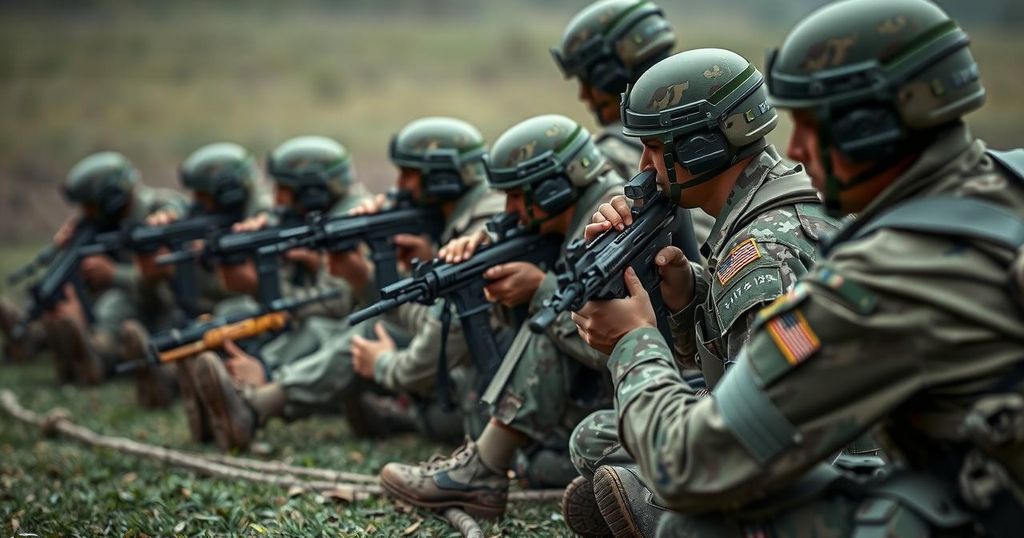North Korea and Russia: New Alliance Transforms into Propaganda Effort
North Korea and Russia deepen military ties as 15,000 North Korean troops assist Russia in Ukraine. Recent propaganda showcases their alliance, marked by North Koreans singing and training in Russia. Despite reported challenges and casualties, the partnership is celebrated at events such as the Victory Day parade, presenting a strong front to counter U.S. adversaries.
In a surprising display of camaraderie, North Korean soldiers have found their way into Russian propaganda as the two countries deepen ties during the ongoing conflict in Ukraine. Recently, five North Korean troops were seen at a training facility in Russia, cheerfully singing the Soviet-era song “Katyusha,” lending their voices in Korean. This moment is part of a broader strategy by North Korea and Russia to enhance the images of their alliance.
The collaboration comes amid reports that North Korea has dispatched about 15,000 soldiers to aid Russia in its military operations against Ukraine since last year. Footage highlighting the soldiers engaging in various military activities features prominently in Russian media—showing them fire shotguns and navigate trenches, establishing a robust image of cooperation between the two nations.
Historically, both Moscow and Pyongyang kept the North Korean troop deployment under wraps. However, recent disclosures paint a different picture of their relationship, contrasting sharply with the narratives promoted by Ukraine and its allies. South Korean intelligence estimates nearly a third of the North Korean troops have either died or sustained injuries while assisting Russian forces.
Russian President Vladimir Putin aims to bolster morale by revealing North Korea’s military involvement. At last week’s Victory Day parade in Moscow, a significant annual event honoring the Soviet victory over Nazi Germany, Putin embraced North Korean military personnel and showcased their contributions to the conflict.
North Korean leader Kim Jong Un, who had only recently informed his citizens about their deployment to the war, is now welcoming home injured soldiers as heroes. This move seems designed to mitigate any backlash within North Korea, particularly given escalating tensions with South Korea. During a visit to the Russian embassy, Kim endorsed his troops, dubbing them “heroes” and a testament to the nation’s honor.
Acknowledging this new joint narrative, state media from both countries has been producing tailored content, portraying North Korean soldiers in a heroic light. Analysts have remarked that such outreach signifies a calculated campaign to solidify the perception of North Korea as a steadfast ally of Russia. Chris Monday, an academic specializing in Russia-North Korea relations, noted, “It’s a calculated campaign to portray the North Koreans as Russia’s ‘war brothers’ whose military support won’t falter.”
Videos circulated by Russian outlets depict soldiers engaging in energetic training routines and bonding rituals. One clip features a Russian and a North Korean soldier planting their respective flags together, which symbolizes unity. In the same segment, North Korean troops also broke into song with a marching tune eulogizing Kim Jong Un.
However, reports from sources in Ukraine and South Korea indicate a different reality. Early interactions during the deployment revealed a lack of readiness among North Korean soldiers, particularly when faced with advanced attack drones. There have even been hints of disdain among Russian troops towards their North Korean counterparts, with some communications suggesting derogatory comparisons.
The military friendship was formalized last summer in Pyongyang through a mutual-defense pact. Since then, North Korea has contributed munitions and missiles to Russia, with half of the artillery shells used by Russian forces purportedly produced in North Korea. Furthermore, economic and diplomatic ties between both nations have been strengthened, including potential cooperation in tourism and agriculture.
Remarkably, North Korean troops have adapted well to their Russian surroundings, as noted in a segment airing on the program “Vesti Nedeli.” A Russian soldier commended the North Koreans for their fitness and rapid language acquisition, remarking, “They’re like brothers to us.” Meanwhile, to accommodate their guests, Russian hosts have made efforts to provide familiar foods like soy sauce and tofu.
As these joint efforts continue, the relationship between North Korea and Russia seems set to develop into a more complex alliance. As one North Korean soldier exclaimed, translating his expression of gratitude in the closing of a state news segment, “spasibo” (thank you) resonates in both nations’ missions—reaffirming their mutual commitment to the ongoing conflict.
The consequences and future implications of such an alliance remain to be seen as both nations navigate an increasingly volatile international landscape.
In summary, the burgeoning military alliance between North Korea and Russia is being amplified through state-sponsored propaganda that portrays their partnership in a positive light. North Korea’s deployment of troops in support of Russia’s military endeavors in Ukraine has not only escalated their collaboration but also fostered a narrative aimed at garnering national support within both countries. Despite this facade, reports indicate the reality of conflict is fraught with challenges. The long-term impacts of this alliance will continue to unfold in the broader geopolitical context.
Original Source: www.livemint.com




1 comment